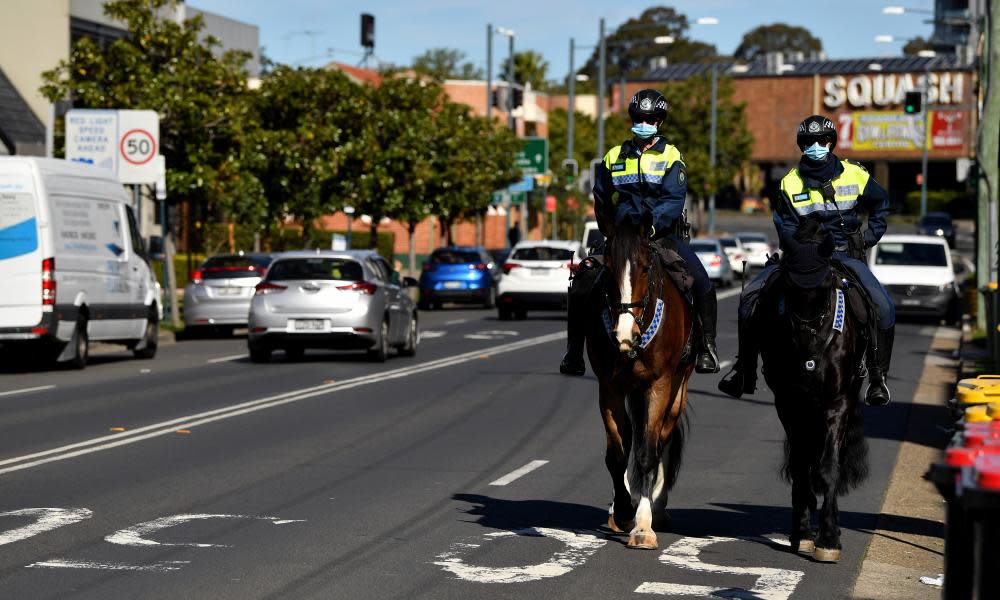Covid fine cancellations underline sense of unfair treatment in western Sydney

When Stephen heard that the New South Wales government was going to cancel more than $30m in fines for breaches of Covid health orders, relief washed over him.
Stephen’s son, who has been diagnosed with schizophrenia, was fined $1,000 on three separate occasions for breaching restrictions during the height of Sydney’s lockdowns in 2021.
One fine was issued when he was on one of his long walks, which form part of his therapy, and another was issued to him for being out of his local government area (LGA), at a time when rules were rapidly changing.
Related: NSW government under pressure to scrap further 29,000 Covid fines after court ruling
“It’s a huge relief they were cancelled, not just because that money no longer needs to be found, but because we no longer need to navigate the bureaucracy of it all,” said Stephen, who asked not to use his surname.
He said his son would have been forced to work off the fines, an outcome that would have been very difficult to organise.
“It was always going to be difficult to find an employer to take on my son, who is in the mental state where he doesn’t even like to go into shops, let alone engage with employers.
“The fines and health orders were approached with such an open slather, with no warnings issued. It just makes you wonder whether police were just trying to rack up their tallies.
“You can’t help but think they went overboard,” he added.
It’s a sentiment that has lingered since restrictions were lifted in Sydney, particularly in western Sydney, home of the infamous “12 LGAs of concern”.
Those LGAs faced tougher restrictions compared with the rest of the city, including limits on travel, a curfew and police and defence personnel deployed to implement the measures.
But on Tuesday, Revenue NSW announced it had cancelled around 33,000 Covid-era fines, nearly half of the total number of fines issued by police for breaches of public health orders in 2020 and 2021.
The fines were cancelled after the government lawyer conceded there was not enough detail about the offence in the two test cases brought by the Redfern Legal Centre.
Related: Australia Covid cases rising but peak before Christmas still predicted
A NSW Police spokesperson said the measures were necessary to reduce community transmission at the time.
“The virulent nature and serious illness from Covid-19 resulted in rapidly evolving Public Health Orders, including LGAs of Concern being nominated by NSW Health.
“A compliance and enforcement response was required to limit movement and ensure compliance with Public Health Orders in these areas to reduce the transmission of Covid-19 and protect the community.”
Elfa Moraitakis, CEO at SydWest Multicultural Services, said many of her organisation’s clients – including many young people – had already paid off fines she described as “heavy-handed”.
“It was obvious then and it’s obvious now how heavy-handed it was. It created a lot of unnecessary division between the east and the west of the city.”
Moraitakis said some of the young clients at her organisation were still trying to fight the fines in court, amid frustrations over who was and was not having their fines cancelled.
“There’s some frustration there, a majority haven’t paid, they can’t, and are trying to either work them off or are hoping to hear that their fines have been cancelled.”
Adam Leto, executive director at Western Sydney Leadership Dialogue, said many of the fines issued were to people who couldn’t actually follow stay-at-home orders.
Related: Australian research finds effects of loneliness during Covid lockdowns ‘substantial and uneven’
“They weren’t hanging out at the beach,” he said. “They had to work, they needed healthcare or needed to care for a family member who lived nearby and required assistance.”
Leto said many households in western Sydney, which includes some of the most diverse and disadvantaged in the city, often found it impossible to “put food on the table”.
“The perspectives for many families in the west, compared to other parts of Sydney, could not have been starker. And as we look to unpack some of the lessons from lockdown, they serve as a useful reminder of the issues and inequity that, as a region, we still need to work hard to overcome.”
Billie Sankovic, chief executive at Western Sydney Community Forum, said the region had a high proportion of workers who could not work from home, and were adversely affected by the restrictions.
Sankovic said that while the decision to cancel the fine was a relief for many families, the decision also emphasised unfairness in the first place.
“The decision to ultimately cancel the fines has damaged the already fragile trust communities had in these decisions,” she said.
“Especially when different rules were applied to different areas, the decisions made then exacerbated tensions, which has only grown now that the fines have been overturned.”

 Yahoo News
Yahoo News 
